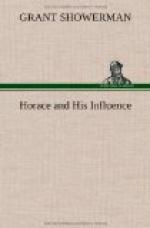There is no such thing as a line marking definitely the time when ancient Rome ceased to be itself and became the Rome of the Middle Age. If there were such a line, we should probably have crossed it already, whether in recording the last real Roman setting of the Horatian house in order by Mavortius in 527, or in referring to Venantius Fortunatus, the last of the Latin Christian poets. The usual date marking the end of the Western Empire, 476, is only the convenient sign for the culmination of the movement long since begun in the interferences of an army composed more and more of a non-Italian, Northern soldiery, and ending in a final mutiny or revolt which assumed the character of invasion and the permanent seizure of civil as well as military authority. The coming of Odoacer is the ultimate stage in the process of Roman and Italian exhaustion, the sign that life is not longer possible except through infusion of northern blood.
The military and political change itself was only exterior, the outward demonstration of deep-seated maladies. The too-successful bureaucratization of Augustus and such of his successors as were really able and virtuous, the development of authority into tyranny by such as were neither able nor virtuous, but mad and wilful, had removed from Roman citizenship the responsibility which in the olden time had made it strong; and the increase of taxes, assessments, and compulsory honors involving personal contribution, had substituted for responsibility and privilege a burden so heavy that under it the civic life of the Empire was crushed to extinction. In Italy, above all, the ancient seed was running out. Under the influence of economic and social movement, the old stock had died and disappeared, or changed beyond recognition. The old language, except in the mouths and from the pens of the few, was fast losing its identity. Uncertainty, indifference, stagnation, weariness of body, mind, and soul, leaden resignation and despair, forgetfulness of the glories of the past in art and even in heroism, were the inheritance of the last generations of the old order. Jerome felt barbarism closing in: Romanus orbis ruit, he says,—the Roman world is tumbling in ruins.
In measure as the vitality of pagan Rome was sapped, into the inert and decaying mass there penetrated gradually the two new life-currents of a new religion and a new blood. The change they wrought from the first century to the descent of the Northerners was not sudden, nor was it rapid. Nor was it always a change that carried visible warrant of virtue. The mingling of external races in the army and in trade, the interference of a Northern soldiery in the affairs of the throne, the more peaceful but more intimate shuffling of the population through the social and economic emergence of the one-time nameless and poor, whether of native origin or foreign, may have contributed fresh blood to an anaemic society, but the result most apparent to the eye and most disturbing to the soul was the debasement of standards and the fears that naturally come with violent, sudden, or merely unfamiliar change. The new religion may have contributed new hope and erected new standards, but it also contributed exaggerations, contradictions, and new uncertainties. The life of logic began to be displaced by the life of feeling.




